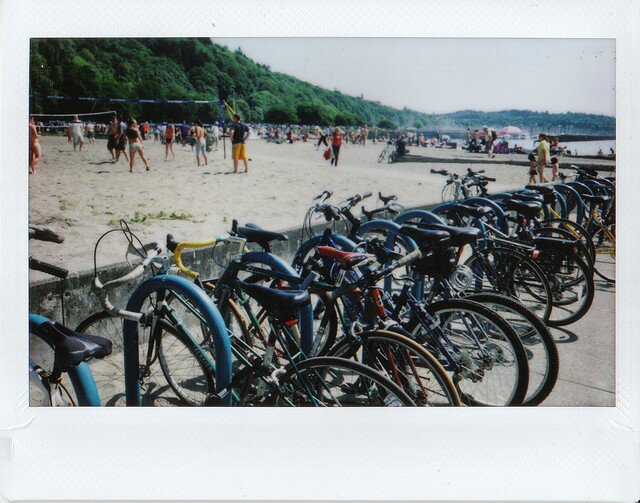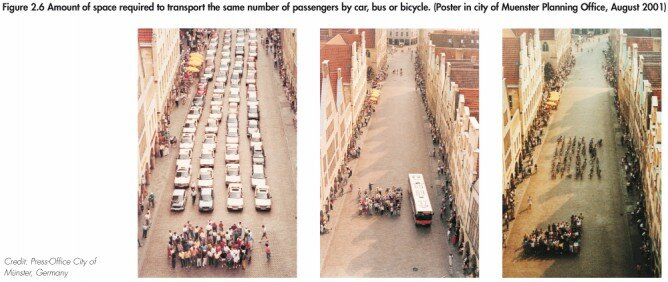
Friday, May 20, 2011, is Bike to Work Day, capping off Bike to Work Week (May 16-20), both of which are part, naturally, of National Bike to Work Month.
The League of American Bicyclists rates Seattle #23 of 244 bicycling communities (er…by population, I’ve been told, not for bicyling-osity). We’re in the top 20 for miles of bike lanes and paths (dropping a bit in the rankings if you rate us by miles/100,000 persons), and we’re in the top 10 in terms of bicycle commuters, with about 10,600 people riding to work on bikes.
That’s just three percent of commuters, but it makes a big difference. See photo exhibit A.
 Apparently it makes a big difference to people who drive cars, though not the way you might think. Danny Westneat had a column this week headlined “What’s with all the bike bitterness?“:
Apparently it makes a big difference to people who drive cars, though not the way you might think. Danny Westneat had a column this week headlined “What’s with all the bike bitterness?“:
“For those of us who daily attempt to ‘share the trail’ with aggressive bicyclers, our lives are in danger,” read an apparently serious letter-to-the-editor that we published this week. “The mandate from their mayor gives them power over our streets, sidewalks and all trails…. When is this going to stop?”
Bicyclists do take lives in their hands, but typically it is their own. Here is a list of bicyclist fatalities that far outstrips the deaths of anyone hit by a cyclist. (To be fair, I can think of one person who was killed by a bicyclist.) This isn’t to say cyclists are any better or worse human beings–just that it’s harder to accidentally kill someone with your bicycle than a car. Conversely, as KING 5 reports, there were 448 traffic deaths in Washington in 2010–and that represented a substantial decline.
While it may be right-thinking, I doubt that the majority of people who have more than a 5-mile commute to work are ready to ditch the car for a bicycle. When Dan Bertolet says, “Requiring people to pay the true cost of their driving is not an ideological conspiracy to force the innocents out of their cars and into spandex bike shorts,” he may be correct, but he’s not persuasive. (UPDATE: Dan points out that he can be plenty persuasive. My bad for not pointing to this post, which I belatedly remember reading.)
The “reverse social engineering” he talks about–to counteract the social engineering that demands you drive a car–is exactly perceived as cutting into the thin household “margins” that the majority of people operate on. That’s why there’s widespread grumbling over the city of Seattle spending even a proportional amount of transportation dollars on bicycle commuters.
It’s a Catch-22: Because society is set up to move the vast majority of people by car, and it’s failing at doing that well (due to a variety of factors, but certainly because urban density precludes a car in every kitchen), there’s stress and pain out there. Rather than reinvent, many people would rather just double-down on wider roads and cheap gas.
Still, to answer Westneat’s question about the bitterness, read Tom Fucoloro on how much fun it is to ride a bike. I think Fucoloro’s attitude is spot on–he highlights the individual pleasures (and sense of accomplishment) that making this decision brings, and leaves the social benefits to the side. Very few people ride a bike, really, primarily to fight traffic congestion. They ride because it makes sense to them, because it’s faster and more convenient, because it’s fun, because they’ve figured out a safe way to commute, because they like the exercise, because their friends ride…and on and on.
The bitterness comes in part from the people who are “stuck” and, whether they know it or not, are envious of the bicyclist. Just as an underwater homeowner is stuck, and is bitter about someone moving to greener pastures, people who commute in cars are stuck, and aren’t happy about it. It’s one thing if we’re all in the commute grind together, but when people opt out and you can’t, it’s upsetting.
Some people are stuck in their cars because they’ve had to make economic trade-offs (affordable suburban house for the family equals 45-minute commute to work). But others are stuck emotionally, and completely anecdotally, I find that these people are the most bitter, and who develop doomsday scenarios from each new mile of bike lanes. Somehow, making bicycling safer and more convenient becomes the equivalent of a loaded gun to the temple, forcing them onto a Schwinn and certain death.
Peruse the angry comment threads on a bike article and you can pick them out: they are the people who can’t find a reason to ride a bike at any time–it’s stupid, it’s silly, it’s not serious. The evident enjoyment, then, that cyclists derive from riding around has to be denied–it’s smugness, it’s spandex, it’s the menacing hordes of The Wild One, it’s Stalinism.
Their emotional stuck-ness translates to their inability to imagine that 10,000 other people have figured out a way to use bicycles as transportation, have negotiated that endless list of reasons-you-can’t by simply deciding to do it. (There’s no right answer–some people use a car for larger shopping trips, some attach a cart to the bike, but when people are frightened or frozen by habit, they just don’t display adaptability.) In their minds, cyclists are somehow faking it.
That it’s non-rational is evident in their attempt to deny someone else’s experience, or even the long-studied results of road diets (generally, speeding abates, capacity is preserved), because they are really arguing with themselves over the possibility of change in their lives. Again, anecdotally, my conversations with people who have good reasons for not cycling, or who just don’t care to, are not drenched in bitterness, as a rule.
But just as a tip, if you bike to work tomorrow, and you meet up with bitterness, try a little compassion rather than an argument. It may not seem like such a big deal to you, but imagine what that freedom means to someone who can’t imagine themselves able to enjoy it.